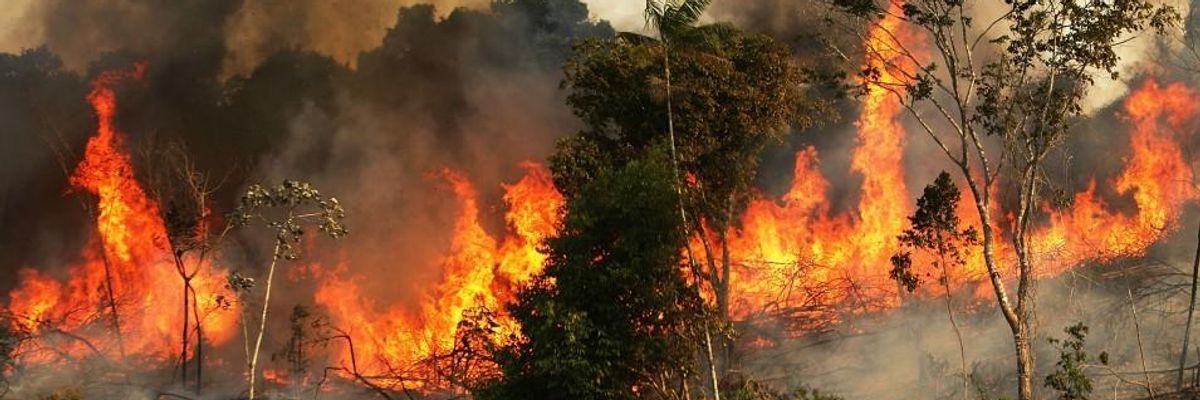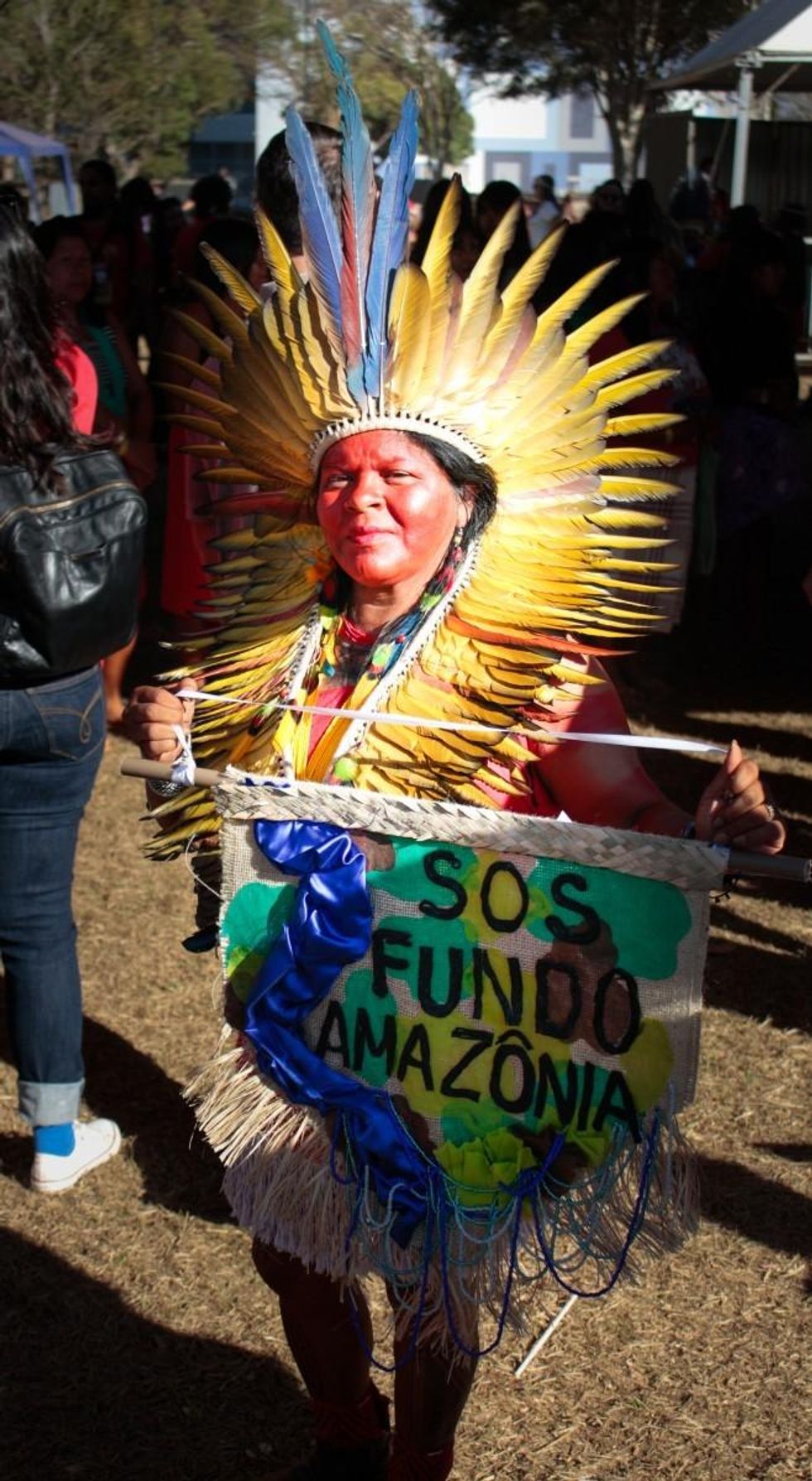In the Amazon, the lungs of our planet are on fire--the vast inferno can be seen from space--gasping and suffocating under the regime of Brazilian President Jair Bolsonaro and economic development models that pose an aggressive attack on Indigenous peoples and their ancestral forest territories.
The Amazon sequesters vast amounts of carbon with its trees absorbing around a quarter of the carbon dioxide released annually by fossil fuels. The Amazon is also a major source of rain and weather patterns that maintain vital ecosystems across South America and beyond, meaning further deforestation will have a major impact on a global scale and contribute disastrously to the climate crisis.
The report found that both cattle ranching and soy industries in Brazil, which together account for 80% of Amazon deforestation, are financed through European and North American banks and investors, such as JPMorgan Chase Bank and BlackRock.
More than 74,000 fires have blazed through Brazil this year, an 84% increase over last year's count in this same time frame. Scientists have made it clear that many of these fires are human-made and cattle ranchers and farmers in Brazil have confirmed their handiwork. This massive social and ecological destruction originates with President Bolsonaro's anti-environmental rhetoric, which falsely asserts that the protection of forests and Indigenous rights are obstacles to economic growth. In this political landscape with encouragement from Bolsonaro, farmers and ranchers are lighting fires with impunity in order to expand their enterprises.
Since his inauguration earlier this year, Bolsonaro has worked to dismantle key protections and policies that protect the rights of Indigenous peoples and the Amazon in Brazil. His administration's devastating assaults on social and environmental protections has led to a surge in deforestation and violations of Indigenous Rights, culminating now in massive fires.
In response to increased threats for Indigenous people and forest protection, Indigenous women from across Brazil joined together on August 13th in the country's capital for the first Indigenous Women's March in Brazil. Their goal? To oppose Bolsonaro's current attacks on their rights, and to visibilize the immense power of Indigenous women and women's role in defending the Amazon and their communities from further harm.
Indigenous women have been urgently speaking out for years, warning about the dangers to the Amazon due to extractive economic models and the demands of fossil fuel, mining, and agricultural companies, all of which have been further emboldened most recently by Bolsonaro's administration. What we see in the Amazon fires are the egregious abuses that result from unchecked capitalism, colonization, racism, and patriarchy -- all of which are based upon the same systems and ideologies that promote power over, and exploitation of women, Indigenous peoples, people of color and the land. These fires and Bolsonaro's many anti-indigenous actions are just a few examples of the long-term systemic efforts of governments and corporations worldwide to enact genocidal policies that harm Indigenous peoples and their territories.
Addressing one of the root causes of the systemic issue, the organization Amazon Watch released a report this year connecting the dots between northern consumers and financiers and Bolsonaro's attacks on the Brazilian Amazon. The report found that both cattle ranching and soy industries in Brazil, which together account for 80% of Amazon deforestation, are financed through European and North American banks and investors, such as JPMorgan Chase Bank and BlackRock. These big banks and large investment companies have a long history of financing industries that destroy forests and commit human rights violations -- from slave labor in Brazil to police violence at Standing Rock. Banks and financiers must be held accountable for their decisions to value profit over people, and this fight must continue even after the recent fires in the Amazon are extinguished.
It is a heartbreaking time for all of us, for the Indigenous communities who have called the Amazon home for generations and who are the best custodians of their forests, for the thousands of unique and diverse species that inhabit the forest, and for the trees who've stood tall providing our entire planet with the air we need to breathe. We are in an emergency and business as usual can no longer be tolerated -- within this context, one of the most important things we can do is to lift up the voices, leadership, and demands of Indigenous people.
The Women's Earth and Climate Action Network (WECAN) International was able to host prominent Indigenous leader, Sonia Guajajara, former vice-presidential candidate of Brazil and National Coordinator of Brazil's Indigenous People Articulation (APIB) in New York City earlier this year for the 18th Session of the United Nations Permanent Forum on Indigenous Issues where she was already sounding the alarm on President Bolsonaro's deleterious actions.
Watch:
This week WECAN International reconnected with Sonia Guajajara for an interview by phone from Imperatriz, Maranhao in Brazil where she shared with us the impacts of the blazing fires.
Can you tell us more about the fires surging in the Brazilian Amazon?
Indigenous peoples have been warning the world about the violations that the whole country has been suffering for many decades under the predatory action of loggers, miners and the agribusiness that has a very powerful lobby inside of the national congress with more than 200 deputies. The Congress is under their influence and also influenced by projects related to big entrepreneurs such as hydroelectric projects that have been growing and becoming more dangerous in this government right now, which empowers violence against the environment and against us, the Indigenous peoples and our territories. One of the results of this political challenge that we have been facing is the increase of the Amazon burnings in the whole country. There are 84% more fires than at this time in 2018 last year. It has been the highest number of fires registered in seven years, as we have been told by the National Institute of Space Research that monitors satellite observations. So it is really a crime against humanity and it can result in existential tragedy.
What is the effect on Indigenous peoples?
Our peoples have been threatened by the fires more than anyone else because we live in the areas where the fires are burning. The concentration of fires is more in the states where an expressive population of our Indigenous peoples live. In these regions, there are even some isolated Indigenous peoples. The Coordination of the Indigenous Organizations of the Brazilian Amazon (COIAB) has denounced publicly the threat from the fires to these isolated peoples who have never had contact with modern society.
What does the resistance movement look like for Brazilian Indigenous women right now?
With all these threats that we have faced, the Indigenous women have united in a big march that we recently organized in Brasilia. We gathered 2,500 women from 130 different Indigenous peoples representing every region of the country. It was the first initiative of Indigenous women realized by the articulation of Indigenous women from Brazil and the theme was Territory: Our body, Our spirit. Throughout three days these women were the protagonists of our fight.
What is the most important thing the international community can do to support you and Indigenous peoples in Brazil and the Amazon?
The international community is helping very much because the life of Indigenous people depends on this fight that we are facing right now, but not only our lives, but the lives of every future generation and our species as humans depends on the collective effort to generate new development models. Humanity has no Plan B for the Earth. Our fight is so urgent that we must all get together right now. The fight for Mother Earth is the mother of all fights. Thank you so much, I appreciate the support I have been receiving from all the international community.


